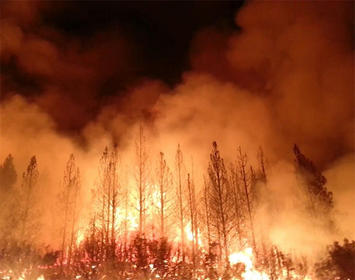
As California continues to throw good money after bad and baste in the fires of its own Gehenna, the White House has threatened to cut off emergency aid (FEMA) to residents displaced by the recent forest fires.
The state’s mismanagement of past funds has put it in the situation it is in today. Rather than patch the hole in the sinking ship the state would rather bring in a larger sump pump to evacuate the water. The water in this case is actually its fire maintenance budget and the sump pump represents more FEMA funding.
Obama-era forestry restructuring regulations waylaid already established preventative maintenance measures that could have averted power outages and raging conflagrations resulting in the need for people to be relocated to safer grounds at the expense of the federal government.
I’m all for safety but, for god’s sake, teach a man to fish, please. If you don’t address the real problem, you’re welcoming the “new normal” where fires burn uncontrollably and electrical infrastructure decays that cost more and more money Washington has grown tired of funneling your way.
California continues to encounter environmental and political battles regarding retrofitting and creating defensible spaces around homes and/or thinning forests to reduce the potential “fuel” for the fires. Those choices will set the tone for fixing the problems or funding other problems created by not preventing the original problems in the first place.
Back in 2012 utility companies lost the authority to manage the greenery within their right-of-way due to Obama-era legislation that changed the management of 193 million acres of national forests and grasslands. Those regulations established a new blueprint to guide everything from logging to recreation and renewable energy development.
The guidelines apply to all 155 national forests, 20 grasslands and one prairie and represent the first major overhaul of forest rules in 30 years. It seemed like a good idea at the time in spite of the loud opposition voices warning against the new regulations.
Residents escaping the high costs of living in urban areas have created a problem for California’s forestry maintenance guidelines. As they move closer to forested areas animals are seeing their habitats disturbed. Utility services are expected to be brought to them no matter where they live.
This expansion into once forested areas is causing headaches for utility providers who want more customers but don’t appreciate the burden minimal forest maintenance has placed on their ability to safeguard their equipment and the public who use it. It has caused them to petition CPUC and receive the authority to shut down services where it deems those services create a public hazard.
Today, electric utility companies up and down the state have all implemented Public Safety Power Shutoff (PSPS) events, aka rolling blackouts, as a last line of defense against electric service disruption and possible massive wildfires to vulnerable communities caused by utility equipment.
Powering down swatches of residential areas affect those on life support systems, residents’ abilities to recharge EVs to escape the devastation and cell phones that need charging; effectively cutting them off from the rest of the world unless they have ham radios or other highly regulated emergency transmission devices. Some of those devices effect communications between fire fighters and emergency assistance first responders.
It is time for Californians to make the right choice to forego their pseudo-environmentalist ways, at least in this case, and rewrite Obama-era regulations of all the country’s forest maintenance and survival rules that have taken away utility companies’ control of their right of ways that allow them to provide continuously uninterruptable electricity to all of its customers. Or invest in fire hazard suits for all their family members and pets who live in heavily forested areas.
It is a given the fires are going to come but we can keep their destruction to a minimum with a modicum of preventive medicine because Washington has grown weary of handing out aid to those who won’t help themselves.
Ron Stein is an engineer who, drawing upon 25 years of project management and business development experience, launched PTS Advance in 1995. He is an author, engineer, and energy expert who writes frequently on issues of energy and economics.
Photo credit: USDA via via Wikimedia in Public Domain.












